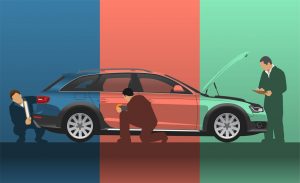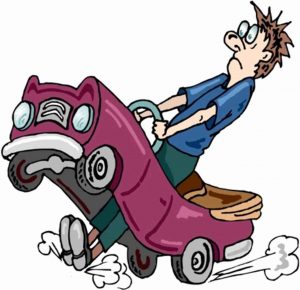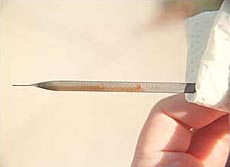Should you even consider buying a used car that’s not “warranted” or “certified/pre-owned” (CPO)?
Many people won’t – because we live at a time when people have been conditioned to dread risk, however remote – and it’s not an accident. Because it’s very profitable to sell “warranted” and “certified pre-owned” (CPO) cars.
There is no free lunch.
People who buy “warranted” and “CPO” cars are paying for the warranty and CPO certification – which doesn’t eliminate the risk of paying for repairs, either. These warranties and certifications will cover some things – for some time. But not all things – and not forever.
The actuaries behind the warranties and certifications aren’t innumerate. They run the numbers. The warranties and certifications – and the price of the warranted and certified cars – is based in part on the likelihood of having to pay out for a “covered” repair.
It is not a high likelihood. The odds always favor the house.
Of course, a compounding problem is that cars have become so forbiddingly complex that most people are out of their depth dealing with anything beyond basic fluid and filter changes. And repairs can be expensive, especially if they involve major items like the transmission or HVAC system or anything electronic.
That said, a little due diligence goes a long way. You do not need to be a mechanical engineer or even a professional mechanic to get a good intuitive sense of a vehicle’s general condition. The same rules of evaluation apply today that applied 30 or even 50 years ago:
Does it start easily and run/drive smoothly?
The engine should not make “funny” noises. No clicking, clattering or knocking sounds. No visible smoke at start-up and especially during off-throttle deceleration. Have a friend in another car drive behind you to check for this. Find a downhill stretch and abruptly let off the gas; if your friend behind you sees blue smoke coming out of the exhaust, the car has problems.
Check the operation of all gauges and lights at start-up. Note any light – especially the “check engine” light – that doesn’t come on or doesn’t go off. It comes on and stays on, there is a trouble code stored in the computer and you need to find out what it is – and what it cost to deal with it – before money changes hands. If the “check engine” light doesn’t come on at start-up, it may have been disabled to hide a problem. 
The engine should reach normal operating temperature within a few minutes of start-up. Engine temperature and oil pressure should stabilize in the middle area of the gauges. Be wary of any gauge reading that is high or low or fluctuating. It might be a bad sending unit or the gauge itself.
It might be something worse.
The transmission should engage quietly and shift smoothly through all gears (don’t forget reverse). Any sensation of “slipping” is a bad sensation.
The car should track smoothly; you should not have to keep a death grip on the wheel to keep it pointed straight ahead on a straight section of road. If it pulls in either direction, something isn’t right. It could just need an alignment; but it might have more serious problems such as accident/frame damage.
Same goes for the suspension. Ride quality varies but unless you’re buying a very high-performance car, the ride should have some give. But it shouldn’t give out when you hit a pothole. And it should not wallow fore-aft like a ’78 Chrysler Cordoba… unless it is a ’78 Chrysler Cordoba.
The brakes should stop the car smoothly – not abruptly. And without screeching. Brake issues are actually less to be feared than many other things that might be wrong with a prospective car because brakes wear; it’s normal to need new pads or even new rotors/calipers and if the car does need them, it’s a haggling point.
Same goes for items like tires, windshield wiper blades and shock absorbers/struts.
What you want to avoid is buying a car that needs things replaced that ought to last the life of the car – like the transmission.
After a test drive of at least half an hour – which will betray things like an overheating issue or some other mechanical malady the seller may be trying to hide – pop the hood and check all fluids.
Fresh oil – which will look honey-colored – is a good sign. A bad sign is a dipstick that doesn’t look shiny after you wipe it off. If it’s a burnt-on brownish color, the car probably had its oil changed not often – or was run very hard.
Automatic transmission fluid is usually reddish. If it’s blackish, look out. Many new cars don’t have automatic transmission dipsticks at all, unfortunately – so you might not be able to do this check.
But you will be able t check the brake fluid in the master cylinder reservoir. If it’s not black or dark brown, it’s a sign the owner gave a damn about maintaining the car.
The overall theme here is: Does the car run and drive well and seem to be basically ok – functionally speaking.
People get hung up on appearances. “Warranted” and “certified” cars usually look great – because the dealers and stores that sell them have professional detailers on staff to make sure they do. Cloudy plastic headlights are polished to bright and shiny new. The interior is vacuumed, the seats shampooed and the whole shebang made to look as much like new as possible.
You’re paying for that, too.
But you might also be be paying for something else – later – if you let looks blind you to what might be under the skin.
…
Got a question about cars, Libertarian politics – or anything else? Click on the “ask Eric” link and send ’em in!
If you like what you’ve found here please consider supporting EPautos.
We depend on you to keep the wheels turning!
Our donate button is here.
If you prefer not to use PayPal, our mailing address is:
EPautos
721 Hummingbird Lane SE
Copper Hill, VA 24079
PS: Get an EPautos magnet or sticker or coaster in return for a $20 or more one-time donation or a $10 or more monthly recurring donation. (Please be sure to tell us you want a magnet or sticker or coaster – and also, provide an address, so we know where to mail the thing!)
My latest eBook is also available for your favorite price – free! Click here. If that fails, email me at [email protected] and I will send you a copy directly!













Eric,
If you say the engine shouldn’t make funny noises or have a click then no one should buy a used Ram with a hemi. They all have an awful ticking noise by 50,000 miles, usually sooner.
ancap, indeed they do…..and you don’t want to be the owner when the chickens come home to roost. They are “defective” as in bad parts. If you found one that barely ticked, I’d bet it has some 90-125 gear lube in the crankcase with 15W-40 oil.
Those are the perfect vehicle to buy cheap and sell high since most of them look brand new. But I think the word is out and has been for a while. I rented one and it would run like stink but was obviously going to be some sort of write-off for Hertz. To be honest though, it didn’t handle worth a damn, not as well as my one ton.
I have two late model rebuilt salvage titled cars. The first is a 2017 Nissan Rogue SL AWD. It stickered for $32.3k. I bought it sight unseen (well, I saw the pictures) on ebay. The seller was a well respected dealer in Detroit that had sold several hundred rebuilt title cars on ebay. I won the auction with a bid of 16.9K. The car was four months old and had 7000 miles. The only damage was a side swipe area on the two driver’s side doors that the dealer fixed. The doors did not come off the car; only the door skins were changed out and repainted. So… I got an (almost) new car for half price. We have had it almost three years and have 31000 miles on it with absolutely no issues whatsoever.
I bought a 2016 Tundra Crew Cab 4×2 TSS model for 20.6k with 49000 miles from a Craigslist add. It was never hit; it was a theft recovery vehicle and the dealer just replaced and painted the pickup bed. Yes, the entire pickup bed was stolen off the truck. Again, absolutely no problems with the truck after two years of ownership.
Now… there is/was no warranty on either vehicle and trading in a rebuilt title car is tough, but if you pay cash (we did), don’t fuss over the warranty (you can buy an aftermarket warranty if you wish) and plan on keeping the vehicle till the wheels fall off (we will) rebuilt title cars are a great way to own a paid off car with years of usage left for literally half price.
Eric, perhaps an article on rebuilt title cars (if you haven’t done one already) might be a good read.
PS: Never have and never will touch a flood car.
PSS: Never have and never will fix a car. I buy them repaired already.
Hi NDB,
I have a buddy who does this “professionally,” as a side gig – and his experiences are similar. I myself would not hesitate to buy a “salvage” car, as you’ve described. I agree – it’s worth an article!
I had some friends with a brand new Suburban have a garage sale. They were keen on that being “consumers” always looking for something better. They lived in a high rent part of town in a new house. They advertised in the paper so every thief in a huge city could get prepared and check their place out
It was obvious that new Suburban was a sweetheart deal for a chop shop. So it was left outside as the garage was full of “stuff”. It was gone the next morning.
It wasn’t all bad news though. While it was stolen and finally located in a very remote part of town, the thieves had removed the front clip along with some other things. They did the owners a great favor though. Took the battery out and just beat the rest of it to crap and poured the battery acid over the entire car. It was just a matter at that point of collecting insurance and getting another. Of course the wife had to boo hoo over it not realizing they couldn’t have done a better thing than destroying what was left.
I’ll go to a garage sale but won’t have one. Some people come just to scope out what you have and we have a lot of “stuff” in the barn, mainly tools. I don’t want anyone to know what’s in there. We might have to leave for a day or two.
We had a charity yard sale once and it was a damned waste of a lot of time and hard work. Spent weeks collecting and sorting stuff, put up with all the weird people one whole Saturday, and then had to dispose of all the donated crap that didn’t sell. I think the grand total proceeds was about $120. I should have just written a check and told them forget about any yard/garage sales.
Now I won’t even advertise anything and have people come to our place (out in the boonies like you now). We are so far out in the sticks no one should really want to come out here anyway, plus I would run out of breath giving directions that people won’t follow. I don’t like ANYONE coming to our place that I don’t know well. If I did try to sell anything I would meet them down at the fire hall or at the gas station or bar down in “town.”
You have to be very careful with salvage cars. There’s a lot of games that go on to stick people who buy them to fix them with cars that are well unsalvageable and of course people who aren’t reputable or just not good at it fixing them.
But another avenue is the lemon buy-back car. Sure it has a problem or two that may or may not have been fixed but it hasn’t been wrecked, flooded, etc. It hasn’t been damaged. It also has a warranty. Most of these cars just need a better set of eyes and hands on them to figure out the issue.
I can only tell you that if you buy from a reputable dealer who has his own body shop and a spootless profile (on Ebay, let’s say), it’s no riskier than buying a car from the classified.
I imagine that’s the point I was trying to make. Used cars are always a gamble. One way to mitigate that loss is what I outlined. My Tundra was never hit. The truck was stolen and the entire pickup bed was lifted off. That’s the extent of the damage. My dealer got another bed (from the junkyard I would guess) and did a great job matching the paint. He even put a rhino liner in the bed so he didn’t have to paint the inside. Fabulous job and I couldn’t be happier.
My Rogue was leased by an insurance company in Connecticut and was side swiped. Since it was leased and the lease agreement had a payout if the car was ever hit, it was “totaled” and my dealer in Detroit fixed it. No frame damage, no airbags, no anything.
Something like 40% of cars on the road have had past body damage. Not probably half of those will have that damage reflected on the Carfax.
Now, I couldn’t agree more about flood cars. Wouldn’t touch one with all the electronics installed.
YMMV
“Never have and never will fix a car”
What??? When a light bulb burns out or it needs brakes you just buy another car ????????
I actually wrench quite a bit on my cars but do not repair any body damage.
Sorry if I wasn’t clear
The factory light bulbs on cars last a very long time. I’ve got factory bulbs measuring their service life in decades on three of my cars.
Well, I’ve still got the original rear brakes at 120K. But 4th set of pads and 3rd set of rotors on the front.
Another good article from Eric about used cars.
I would say its much more complicated to know if a used car is ‘good’ or not.
We know that anyone selling a car has numerous ways to hide wear and damage.
There is even an article here which discusses ASS, and if sales people are intentionally turning it off for test drives.
So how can you know if a used car will be ‘good’ or not?
You cannot know, you can only guess based on the available information.
Big issue number 1 is automatic transmissions. Based on the number of repairs, rebuilds, and replacements for any manufacturer it is clear that at least one third of all cars over 100000 miles will have a transmission problem. Since that is really an average, it is likely a bigger problem based on the type of car.
There is no way to know the True condition of an automatic transmission, even if you take it apart and look at it (in most cases). If the car has a CVT transmission, they just suddenly die one day with no symptoms.
Issue number 2 is the Driver Retard. You do not know how the prior owner drove the car.
You can look at fluids and other details to guess the level of maintenance on a vehicle, but you cannot be certain what maintenance was done in the past, and what was done right before the car went on sale.
The car could have spent hours in drive-thru’s or been left running every day while eating lunch with the climate controls on.
It could be a turbo or GDI engine which did not get the proper type of fuel, or was always dogged at low RPMS (see all that black soot on the exhaust…)
You really have almost zero reliable options to check out a used car with any certainty.
The things you can see with your eyes will rarely tell you the whole story, and the driver could have radically shortened the life of the car just by how they drove it.
I can’t know any of those things about any new or used car on any length of test drive.
I guess working in a dealership repair shop showed me things about new cars that wouldn’t have been visible on comparable used cars. More things have gone wrong with a used car and fixed than could have gone wrong with a perfect new car.
I have never owned a new vehicle.
I drove one for about 6 months, until I quit the job that it came with, as the best perk.
It was a 1984 Chrysler LeBaron, and it spent several days in the dealership trying to fix its problems. It had two. Either it would start easily and quickly and then couldn’t get out of its own way, or it was hard to start and ran like a scared cat. Each visit to the dealership toggled these problems. The best part about the situation was that the car was a good excuse not to send me out on late night service calls, so I never went on any. My boss was a racist, skirt-chasing septuagenarian who couldn’t fix anything without changing parts until it was fixed. He would never refuse to go out on a late night service call because it gave him a chance to cheat on his wife.
Hi Vonu,
I have bought and sold dozens of vehicles in my time; but the only new vehicle I ever bought was my 2003 Kawasaki ZRX. I had to have this bike – having grown up watching Eddie Lawson race his big ZED (which inspired the ZRX). It was the closest I could get to ordering a brand-new 1973 SD-455 4-speed Trans-Am in Brewster Green….
eric, I’m laughing my butt off. My MIL was a really nice woman who always drove big GM sedans. She had good taste. So her second husband got into a car buying thing with some flimflam buddies and bought a couple different cars, one being the little turbo Chrysler thing that ran like stink and a Ford Granada, a real POS. One Christmas he didn’t give her a present the Christmas Eve but nobody thought anything of it. The next morning he took her out to his new acquisition FOR her. It as a Chrysler Cordoba, slightly used. She looked like she’d been slapped with a wet towel. I felt sorry for her but she regained her composure and gushed a slight amount, got in it, then went back in the house.
Nobody had to send anyone in the family a telegram. It wasn’t long before it was gone and replaced with another vehicle she didn’t like, a Mitsu small SUV. My heart went out to her but I kept my mouth shut.
We left for home later. Got into the old El Camino and we both sighed, thinking about that Cordoba. I rarely drove(no instant on radar and I had an Escort)less than 110 so it was a nice smooth uneventful drive home. Every now and then we’d look at each other and say just a little bit but we were both thinking about that Cordoba and how grateful we were to not be the owners/victims.
I never quite understood the Chrysler fanboys. Even their biggest cars were junk. Get out of an Imperial and into a Buick and you’d realize why you had a big GM.
Your advice about Chrysler versus GM might have been true 30 years ago, but not now. Buicks have just about vanished other than those funny little crossover things. Still popular in China I hear. Made there now.
I’ve driven big Chryslers for 20 years now and while a few early bugs, most held up very well. There’s a reason why the big block Chrysler 300 C is still being made and sold, virtually unchanged for a decade. Of course some better add-ons, bells and whistles. Compare those to Mercedes, Audis, upper end Toyotas and Hondas. Then save about $20K for the same or better.
30 years ago would have been 1990. That’s a bit new for me. I’m thinking 50-60 years ago. I may be old but I can still appreciate a 70 model Buick deuce and a quarter or 98 with a Rocket 98(455)engine.
Even the 72 model which had better suspension and brakes was a real hauler(98) with reduced C.R.
I’ve never owned one but always wanted a Vista Cruiser. Stick 9 people in it and pull a big boat. Now that was fun.
There are those who’d say the 49 Rocket 88 was the first supercar and that would be hard to refute. As some said, a Rocket 88 would suck the chrome off a Ford.
Har, I haven’t seen that horrible Ricardo Montalban commercial in ages.
I buy old cars and “self-insure”. If the car needs expensive work down the line, dump it and get another. Actually I usually keep two old cars going, so when one dies I can drive the other while looking for a replacement for the first.
There was no such thing as “Rich Corinthian Leather”.
Hi Bob,
Sure there was; right there in the product brochure! Just like Pontiac’s “Morrokide” seat covers.
eric, good one!!. I’m not sure there was even leather in Corinthia. But that Morrokide was some bad ass stuff…..really. It was Naugahide for cars and damned durable stuff too. There must have been billions of those “Nauga’s”.
Bought a “CPO” 2013 Silverado 2500HD a few years back from a dealership about 50 miles away.(First mistake)
Because the truck “appeared” to be in good shape,and was bright and shiny,I thought…”oh CPO,everything is hunky dory la de da etc” (bad mistake)
It had some broken exhaust manifold studs,which a mechanic friend with a good ear found.
Also,the first time I used the parking brake,it froze up and would not release,because the previous owner probably never used it.Self adjusters totally rusted,etc.
I totally admit I had my head up my “Cuomo”,and I learned the hard way,but learn I did.
As I have since found out, the CPO certification,and the “quality” of the used vehicle,depends on the dealership’s integrity.
The one I went to,sure knew how to make check marks on the certification checklist.
Hi Howie,
Sorry to hear about your experience – which is fairly common, unfortunately. It’s an analogous to getting a home inspection prior to buying a house. People assume the house is ok because it was “inspected,” which gives them an often false sense of security.
As in all things, due diligence is key…
I had my house inspected before I purchased it. The inspector missed a lot of obvious problems.
Hi Bob,
Yup; my ex bought a place after we divorced. The “inspector” told her the heat pump/furnace was nearly new. Turned out it was more than 25 years old and she had to replace the works within a year of buying the place.
My wife and daughters picked out a Soobie for them to drive to HS. The dealer boasted this hundred and something point “inspection.”
Well, one of the “inspection points” must have been to clear the engine codes so that they didn’t show up until the day after we bought it. (clogged cat – “not covered by service plan”). Another “inspection point” apparently was to cut the boots on the rear axle, squirt in some grease, and then sorta close it up again with hose clamps. So when the axles went out a few months later, those were not covered by the service plan either since they had been tampered with even though it was drive train.
Oh, and get this: the guy who owns this huge multi-brand stealership is a big “Christian” who campaigns against MJ legalization and stuff like that.
Other than that though, I’ve had pretty good luck buying used vehicles just based on my own estimation (similar to what Eric described). Of course, I always try to buy cheap enough that I can afford to fix some things because you always will have to.
Hey Eric, just me, or are cars getting more unreliable these days, as in they’re built to last ’til X, then they start failing?
Could be argued all cars aren’t meant to last, but there’s the article of the 700k miles Corvette (https://www.roadandtrack.com/car-culture/a13516646/700000-mile-c5-corvette-donated-to-corvette-museum/), TONS of old turbo diesels that still go strong over 300k miles, that million mile lexus, etc.
I recently had to buy a replacement for the TDI Jetta (RIP – the step son ran it up on a guard rail). I limited my searches to manual transmissions, as you can usually tell if a manual is happy easier than an automatic. Also, if someone bought a car with a manual it’s often because they -wanted- a manual and were more of a car person than one who’d buy an automatic.
I ended up finding a one owner ’05 Camry, 125000 miles, that a guy with a car dealer license bought from an auto auction (not open to us plebes). He had the original title, which showed the odometer as 84 miles and had been bought and traded in at Toyota dealers.
Besides that, also $$$ saved going elsewhere and doing your due diligence.
Also, find a trusted mechanic in the area and ask what the aftermarket solution is to weak links.
Ex: Old buddy of mine wanted a BMW, cooling issues and stuff from plastic parts, solution would be spend a little extra for metal water pumps, silicone hoses, better rad, etc.
As far as brakes, some cars will by default brake hard, like the Cayenne my parents leased. V6, so it wasn’t anything to write home about, but just put your pinky on it and you’d slam stop.
After all this, looks like I need new friends, as even if I send this, they’re gonna listen for 5 minutes and go back to the sheep programming
Another potential warning sign to check. Do all the warning indicators come on as the manual says they should at key-on? For example, if the airbag warning light does not come on, it is a potential indication someone has deactivated the light because the airbag system is deactivated. That in itself may not be a deal killer for all buyers, however, it may also indicate the car has had a wreck in its past that activated the airbags, and the owner did a quick and dirty repair job on the crash damage, and not just with the airbags, but maybe with suspension, bodywork, etc. Poke farther, such a thing says. If the oil pressure light is deactivated…run, do not walk away from it!
Also, do an online search for stock faults (“common repairs”) in the vehicle you’re going to check. For example, VW had a run of trouble with air conditioning compressor control valves about 10 years ago. The valve clogs up with fine debris, and the A/C becomes slow to start up, then won’t start up at all. Happens about every 4 years of driving. No codes, no fault lights, just pressures indicative of a bad compressor. The factory fix is to replace the compressor (~$2K at the stealership, ~$750 elsewhere, ~$300 for a GOOD aftermarket compressor), or just replace the valve itself for ~$75 in parts and refrigerant.
Just about every modern car has something along these lines, ignition coils in Nissans and VWs and others, cooling fans in certain Jeeps, sludge in some Toyotas, cylinder head gasket leaks in some Subarus, timing chain failures in some GM V6’s, etc. Look them up and check them out.
Good advice. Only two types of people typically buy new cars, rich people and idiots. I would also suggest making a checklist of these things and others you want to check. On the spot, it is often difficult to remember everything you want to check, so it would’t hurt to give yourself a reminder.
Can’t disagree with that, just my folks are rich and they generally lease
Up until Eric, I was buy new to mod it, now I’ve seen the light and look used to avoid Saaaaaaafety features and ASS
Hi Dan
Guess I am an idiot. 🙁 I buy new because I don’t like mechanican unless I have to. Not that I can’t,,, I just don’t want other peoples problems. Today many if not most have no intention of keeping a car so they have no problems mistreating it. Leased cars are like those rentals they sell off. People treat them really rough. They smoke and eat in them and really trash them out. They will do only the work required to keep the warranty active.
In the past I have bought used,,, but always had to do initial work to make the vehicle dependable up to my standards. Took months to eliminate smoke/vomit/baby shit odors and yes I know the depreciation.
I have a 98 Regal that I purchased new which looks and runs like new. If you have to buy used I can understand it but if you can afford it a new car comes with a clean slate. Much easier to keep it that way.
I think you may have missed my point, but perhaps I went overboard saying “rich people.” “People who can actually afford them” might have been more appropriate. My point was that too many people with no business making such a purchase end up with massive amounts of debt on something that loses value at a ridiculous rate.
annonymous was me by the way, oops
In the “old days” you could buy a new car/pickup fairly cheap (2-3 yrs payments) and they were still fairly simple so you didn’t have to worry so much about problematic new technology. I know that decades ago I didn’t take care of things as well as I should have because, well you could always buy a new (or newer) one when it wore out or you just got tired of fixing it. I just could not foresee that cars as we knew them would cease to exist and be replaced by these godawful nanny state appliances 🙁
Hi Ken,
Some inside baseball I probably should have added to the article but left out for space reasons: As you know, I test-drive brand-new cars each week; I’ve been doing that for almost 25 years now. I have had problems with brand-new cars. Brand new press cars – which you’d think would have been gone over very carefully before being handed out to a journalist. And yet, it is a pretty regular thing to have things go wrong. So, new isn’t a guarantee you won’t have problems – just that they’ll be “covered.”
Until the warranty runs out!
Hi Eric
Agreed,,, but the odds are better!!
Well,,, I don’t question people that buy used or new and I do not buy specifically for warranty coverage,,, I do most of the work, keep the receipts. I wouldn’t trust a dealer with my lawnmower unless a serious problem. Some items, like a serious engine/tranny problem,,, yes of course I’d let the dealer look at it. If something expensive then the warranty will cover. On a used car,,, you are likely out of ruck.
If they (new and used) make a year without problems then they’ll probably be okay.
Today, these new cars,,, too expensive for me,,, 7, 8 10 year loans, No Way Hoss. All those helpful items like Lane Assist,,, No Way. Which is what corpgov is aiming for.
Last new vehicle I bought was a 16 Frontier with the six. It’s well built and has a good reputation. Turning radius sucks but its good otherwise. Also dislike the 5 inch ugly monitor which I only used for the clock because I can’t figure out how to turn that off.
It’s what the previous owner does to a vehicle that I am most concerned about.
Yes Eric, you’d think you’d be in a special category. I guess cars are now like many personal computers (and are full of computers themselves). The word on these is that if your new PC runs okay for a month or two, you’re good. The problems tend to crop up early. I’ve had small problems with brand new cars but they were quickly fixed by the dealership. Aggravating though.
I bought a new car that lasted for 23 years and 411,000 km and was only junked because I made a mistake that killed the bearings. That one was my second new car pourchase. My first purchase was a small car that only needed a battery replacement, 2 tires, and an exhaust system that corroded due to conflicting metals. That one got me 40 mpg around town and 52 on the road.